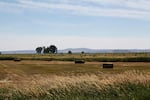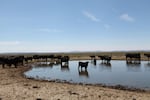A federal judge in Portland is set to hear testimony from witnesses on Friday about whether to allow a controversial ranching family in Harney County, who was at the heart of the 2016 occupation of the Malheur National Wildlife Refuge, to graze its cattle on certain public lands.
Environmental groups are trying to block the federal government from allowing the Hammonds access to some grazing allotments near Steens Mountain in rural southeast Oregon. They cite harm caused by cattle to sensitive wildlife habitats and past abuses of public on lands — including criminal conduct — by the Hammonds.
The federal government argues there isn't evidence to support a preliminary injunction, a view also supported by agricultural groups and Harney County.

A view from the Malheur National Wildlife Refuge in Eastern Oregon.
Conrad Wilson / OPB
The Hammonds were the impetus for the 2016 wildlife refuge takeover. Occupation leader Ammon Bundy's idea was to prevent Dwight Hammond, and his son, Steven Hammond from having to return to federal prison to complete a sentence stemming from a 2012 arson conviction on public land.
In 2018, President Trump pardoned the Hammonds. Months later, as one of his final acts in office, then-Interior Secretary Ryan Zinke signed off on returning the grazing rights to the ranchers. The Bureau of Land Management started the process, but it has been temporarily blocked.
In May, Wildearth Guardians, the Western Watersheds Project, and the Center for Biological Diversity filed a lawsuit arguing if the Hammonds are allowed to graze their cattle on certain parcels of BLM land it would cause "irreparable harm."
"The Hammond grazing allotments encompass high-value sagebrush habitats essential to greater sage-grouse and stream segments important to redband trout," the environmental groups wrote in their lawsuit. "Cattle grazing greatly alters the structure and composition of riparian zones and hence their inestimable value as centers of biological diversity."
The Hammonds are currently grazing cattle on some parcels of public land.
On June 4, U.S. District Court Judge Michael Simon granted a temporary restraining order, which expires after 28 days. That order has blocked the Hammonds from grazing cattle on two BLM parcels.
Now, the trio of environmental groups are asking Simon to extend his order with a preliminary injunction, which would stay in place until the litigation gets resolved.
While the case centers around wildlife and the environment, it's also raises concerns about how the Hammonds have engaged with federal lands in the past.

Dwight Hammond Jr. greets protesters outside his home in Burns, Oregon, on Jan. 2, 2016.
Amelia Templeton / OPB
"Dwight and Steven Hammond have exhibited a pattern of conduct and behavior that disregards the special values and other multiple use values the grazed allotments provide," the lawsuit states.
Between 2001 and 2016, the Hammonds set fires on public lands, removing wildlife habitat to increase food for their cattle, the lawsuit states.
"Their conduct and behavior endangered firefighters and members of the public," according to the lawsuit.
In 2014, the BLM denied the Hammonds permits, citing their activity on public land.
For its part, the BLM says a preliminary injunction would go too far.
"The evidence quite simply cannot support a judicial finding that Plaintiffs are likely to suffer an irreparable injury in the absence of the preliminary injunction they seek," an attorney with the U.S. Department of Justice wrote in a court filing.
The Oregon Farm Bureau, a nonprofit that represents agriculture producers in the state, also filed briefs opposing a preliminary injunction. While the bureau is not part of the case, it was permitted to file friends of the court briefs.
The Farm Bureau argues the environmental groups have failed to demonstrate they will suffer irreparable harm.
"... Plaintiffs’ alleged harms to the sage-grouse and redband trout are too uncertain both in as an open-ended inevitability and, more correctly, limited to the period until a decision on the merits," attorneys for the Farm Bureau wrote in court filings. "A sufficient injury is one 'that is neither remote nor speculative, but actual and imminent.'"

Cattle grazing in Harney County, Oregon on July 19, 2018.
Conrad Wilson / OPB
For its part, Harney County argued a preliminary injunction that prevents the Hammonds from grazing would hurt the region's agriculture-based economy and increase wildlife risks.
"Further, an injunction would exacerbate tensions in the local community relating to federal land management policy by vindicating extreme ideologies precipitated by the Hammond family situation," according to court papers filed by the county. "The County is trying to move on from those controversies, fueled by extreme ideologies on both ends of the spectrum [the Bundys and plaintiffs]. An injunction will only reopen old wounds. Whereas, denying the injunction would allow the local community to continue to heal."
Friday's hearing before Simon is expected to last several hours. Sage grouse and fish experts along with BLM employees are expected to testify and be cross examined.
